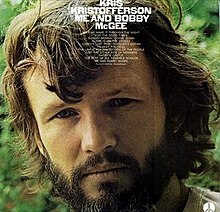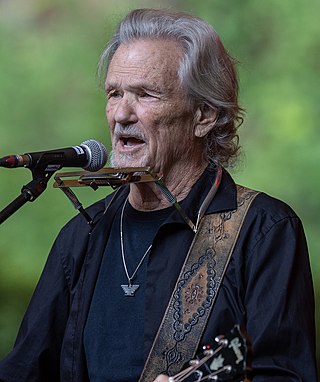
Kristoffer Kristofferson is an American retired country singer, songwriter, and actor. Among his songwriting credits are "Me and Bobby McGee", "For the Good Times", "Sunday Mornin' Comin' Down", and "Help Me Make It Through the Night", all of which were hits for other artists.
Fred Luther Foster was an American record producer, songwriter, and music business executive who founded Monument Records and Combine Music. As a record producer he was most closely associated with Roy Orbison, and was also involved in the early careers of Dolly Parton and Willie Nelson. Foster suggested to Kris Kristofferson the title and theme of "Me and Bobby McGee", which became a hit for Kristofferson, Roger Miller, and Janis Joplin, and for which Foster received a co-writing credit.

"Me and Bobby McGee" is a song written by American singer-songwriter Kris Kristofferson and originally performed by Roger Miller. Fred Foster shares the writing credit, as Kristofferson wrote the song based on a suggestion from Foster. A posthumously released version by Janis Joplin topped the U.S. singles chart in 1971, making the song the second posthumously released No. 1 single in U.S. chart history after "(Sittin' On) The Dock of the Bay" by Otis Redding. Gordon Lightfoot released a version that reached number 1 on the Canadian country charts in 1970. Jerry Lee Lewis released a version that was number 1 on the country charts in December 1971/January 1972 as the "B" side of "Would You Take Another Chance On Me." Billboard ranked Joplin's version as the No. 11 song for 1971.

Sit Down Young Stranger is Canadian singer Gordon Lightfoot's sixth original album and his best-selling original album. Shortly after its 1970 release on the Reprise Records label, it was renamed If You Could Read My Mind when the song of that title reached #1 on the RPM Top Singles chart in Canada and #5 on the Billboard Hot 100 in the US. The album itself reached #12 on the Billboard 200 chart. In Canada, the album was on the charts from April 18, 1970, to November 27, 1971. It peaked at #8 on March 13, 1971 after an earlier peak at #12 on June 20, 1970. Its last 24 weeks were spent in the 90s, except for two appearances at #88 and one at #100.
Milton Sims "Mickey" Newbury Jr. was an American singer-songwriter and a member of the Nashville Songwriters Hall of Fame.

William Lance Swan is an American country singer-songwriter, best known for his 1974 single "I Can Help".

The Silver Tongued Devil and I is the second studio album recorded by singer-songwriter Kris Kristofferson. It was produced by Fred Foster, released in July 1971 on Monument Records and followed his critically acclaimed debut Kristofferson.

Highwayman 2 is the second studio album released by American country supergroup The Highwaymen. This album was released in 1990 on the Columbia Records label. Johnny Cash had left Columbia several years earlier, making this a "homecoming", and ultimately his final work for Columbia as the next Highwaymen album would be issued on another label.

Border Lord is the third album by Kris Kristofferson, released in 1972 on Monument Records.
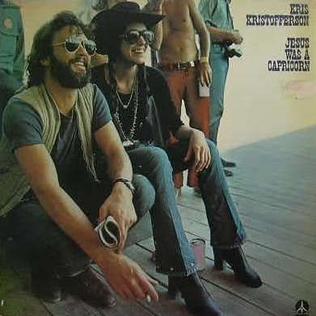
Jesus Was a Capricorn is the fourth album by Kris Kristofferson, released in 1972 on Monument Records. The album cover pictures Kristofferson and his soon-to-be wife Rita Coolidge. "Why Me" reached #1 on the Country singles charts.
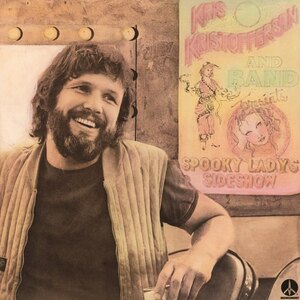
Spooky Lady's Sideshow is the fifth solo album by Kris Kristofferson, released in 1974 on Monument Records. It was preceded and followed by duet albums with his wife, Rita Coolidge. It was recorded shortly after Kristofferson's appearance in the movie Pat Garrett and Billy the Kid. The album mostly consists of songs about decline due to alcohol and drug abuse. That theme of decline proved to be (unintentionally) prophetic as this was Kristofferson's first album that failed to see commercial success on a large scale.
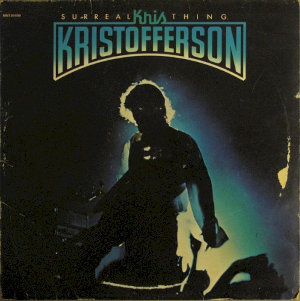
Surreal Thing is the seventh solo album by Kris Kristofferson, released in 1976 on Monument Records. "Killing Time" and "The Golden Idol" are re-recordings of songs that were originally released as a single in 1967.

Repossessed is an album by Kris Kristofferson, released on Mercury Records in 1986. It was Kristofferson's first full-length solo album since 1981's To the Bone, although the singer did collaborate with other artists in the meantime, most notably on Highwayman with Johnny Cash, Waylon Jennings and Willie Nelson.
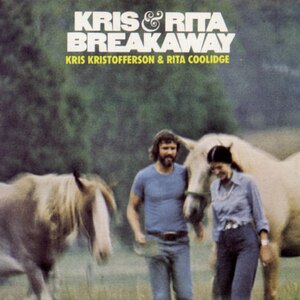
Breakaway is the second duet album by Kris Kristofferson and Rita Coolidge, released in 1974 on Monument Records. It is one of three duet albums by the couple. Unlike Kristofferson solo albums, it features several covers. "I've Got to Have You" and "I'd Rather Be Sorry" had both previously been hits for other artists; they appear here by Kristofferson for the first time.

"Why Me" is an American country and gospel song written and recorded by American country music singer and songwriter Kris Kristofferson.
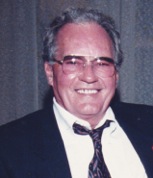
Robert Joseph Beckham was an American country music publisher based in Nashville, who mentored generations of songwriters as head of Combine Music Publishing from 1964 to 1989. He played a pivotal role in the career of Kris Kristofferson and guided other artists including Dolly Parton, Larry Gatlin, Tony Joe White and Billy Swan.

Songs of Kristofferson is a best-of compilation album by Kris Kristofferson, released in 1977, after he had become more well known as a movie star than as a singer-songwriter. It includes tracks from his albums Kristofferson, The Silver Tongued Devil and I, Jesus Was a Capricorn, Who's to Bless and Who's to Blame and Surreal Thing. The album was re-released on CD in 1990.
"For the Good Times" is a song written by Kris Kristofferson, first recorded by singer Bill Nash in 1968 before appearing on Kristofferson's own debut album in June 1970. After a recording by Ray Price became a #1 hit single in June of that year, the song established Kristofferson as one of country and popular music's top songwriters while giving Price his first chart-topping country and western song in 11 years.
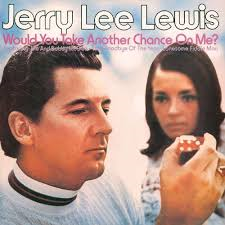
Would You Take Another Chance on Me? is an album by Jerry Lee Lewis that was released on Mercury Records in 1971.

A Star Is Born is the soundtrack album to the 1976 musical film of the same name, performed by its stars Barbra Streisand and Kris Kristofferson. The album was very successful, holding the number-one spot on the US Billboard 200 chart for six weeks and eventually was certified 4× Platinum by the RIAA for more than four million units shipped and has sold a total of eight million copies worldwide.

